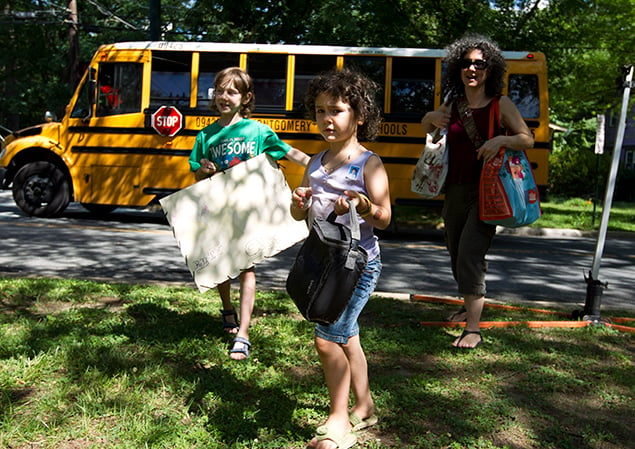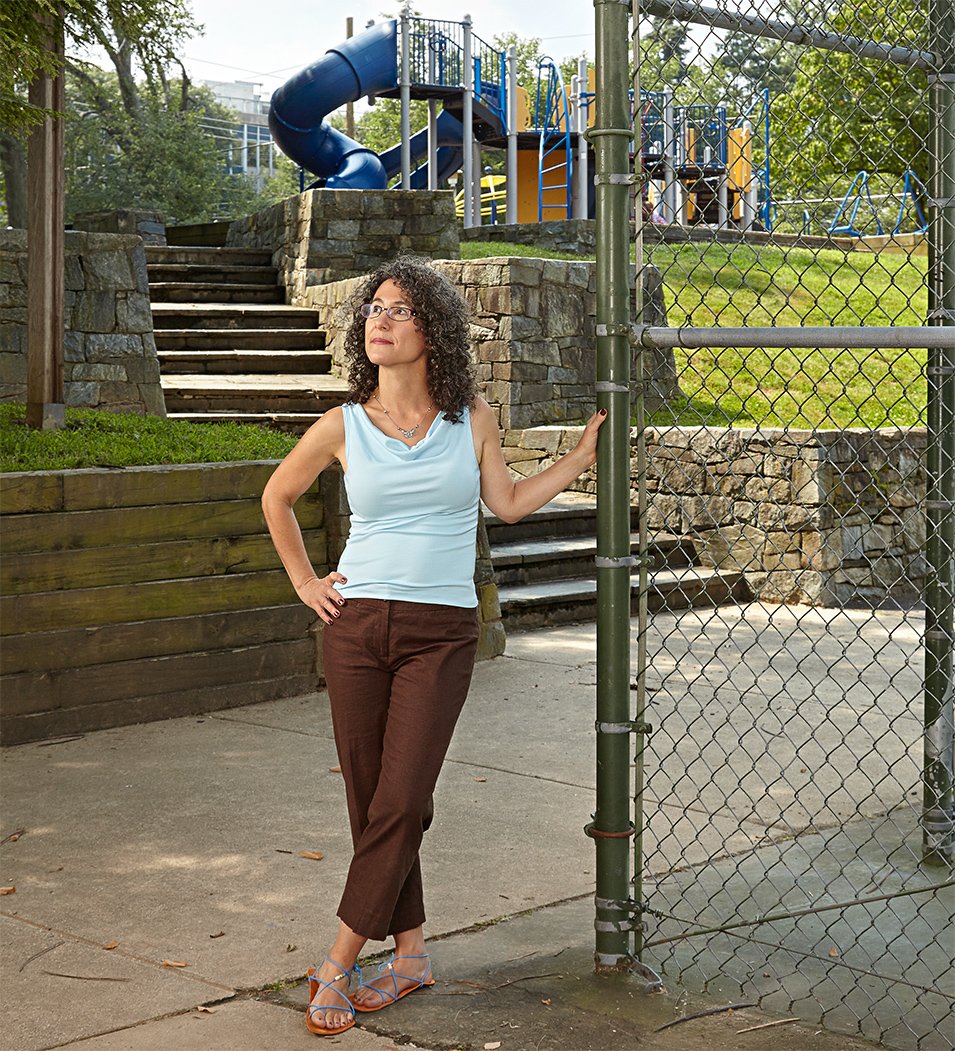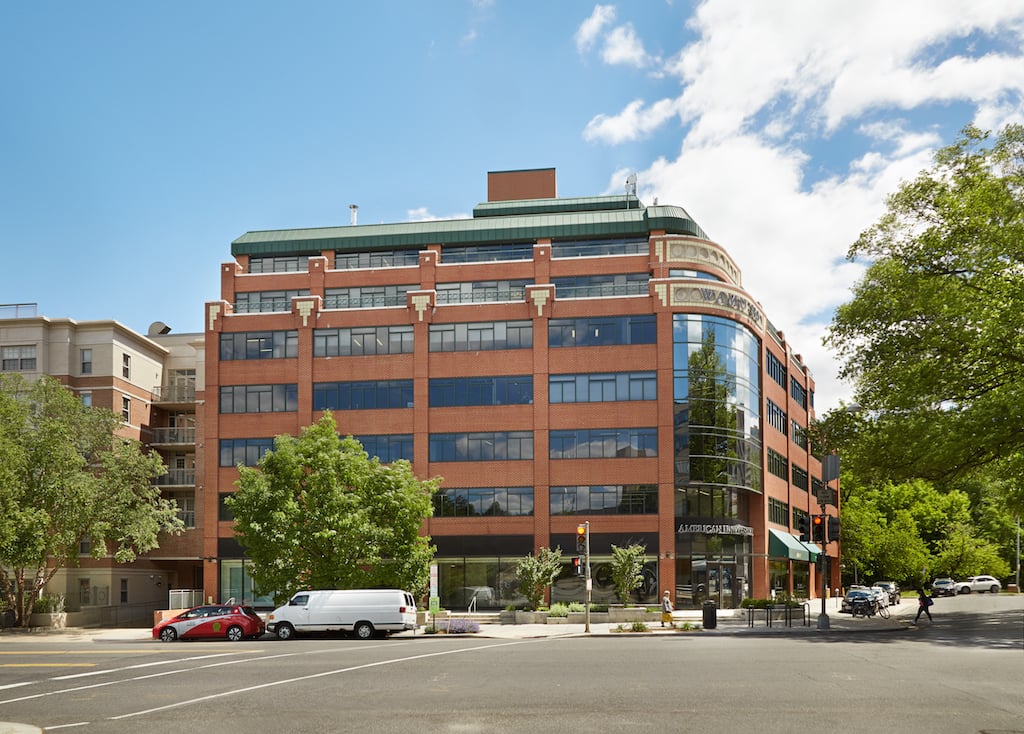Danielle Meitiv, better known to Montgomery County authorities, Washington media, and pretty much every parenting blogger on the internet as the mother of Silver Spring’s “free-range kids,” may soon be even better known.
Meitiv—who, along with her husband, was twice investigated for neglect for letting her children, then-six-year-old Dvora and ten-year-old Rafi, roam alone near their suburban home—is at work on a book about her experience and hatching a nonprofit that aims to free children from what she sees as an unhealthy amount of governmental nannying. Oh, and she’s also preparing a lawsuit against Montgomery County Health and Human Services and police.
I ran into Meitiv in a Silver Spring coffee shop soon after the final neglect investigation cleared her and her Russian-born husband, Alexander, an NIH scientist. The woman whose face I recognized from print, network, and cable news explained that she and her husband were about to leave for Berlin to take a break from months of attention—“I didn’t realize what a fishbowl I was in,” she said later—but she agreed to speak to me from Germany via Skype.
Where and how did you grow up?
I grew up in Queens during New York’s big crime wave of the 1970s and ’80s. When I was eight or nine, [serial killer] “Son of Sam” was running around. In New York, you start taking public buses to school in third grade. They hand you a bus or subway pass, depending on where you live. The idea of a line of cars waiting for pickup would have been ridiculous.
Why do you think we’re so concerned nowadays?
If you ask them what they are afraid of, most people can’t tell you. I think it’s Etan Patz [the boy kidnapped in New York City’s SoHo in 1979]; it’s the news, those stories beamed into living rooms. Also, we have a huge ambivalence about women working, the fact that there are no moms at home. We still think parents have a magic power to keep kids safe. The first time child protective services came to our door, they said, “You can’t have kids at the park by themselves.” When my husband asked why, they said, “She could fall and get hurt.” And my husband said, “But she could fall while I’m there.”
And we have lost community institutions. We don’t know our neighbors, and the person you don’t know is potentially dangerous. That’s almost built into our biology. Statistically, stranger danger is a less likely risk than those known to a child.
You have an undergraduate degree in biology and a graduate degree in oceanography. Does your science background affect how you think of risk?
We aren’t brave-new-world, data-experiment parents. I love my kids, and I worry about them. But I worry about things I can actually do something about. We buy organic and make sure they get sleep and wear sunscreen. But worrying about something so rare—in some ways it’s irrational.
Do you have any limit on how far your children can walk on their own?
People ask me, “How did your children do this astronomical feat?” You’d think I was training my kids to use a trapeze! There’s an aquarium store by the Beltway that’s two miles from the house, and [my husband and I] say that it’s too far for my daughter. Our concern is traffic—it’s not like she can’t go two miles because of a predator.
So how do you decide what’s safe?
Dvora had been walking to and from synagogue every week [with us] since she was four, a mile each way. We would cross Georgia Avenue. So that’s part of it. My kids walk. Not all kids walk. A mile through Silver Spring wasn’t crazy. That first time they were picked up, this was a big adventure. It was the first time we said they could do it, and they got picked up!
Did you mean to test the boundaries?
At no point did we say, “Ha ha, let’s test child protective services!” We’d been in the car for six hours [at the time of the second incident]. We knew a walk was best for them. The idea that we should cave—that would be an abdication of our responsibilities.

You’ve been accused of using the kids as pawns to make a point. The New York Times blog Motherlode, as well as the Washington Post’s editorial page, suggested you might have backed down after the first incident.
Right, give up my constitutional rights because I’m afraid of the state. That’s why my husband left the USSR! It didn’t occur to me that someone would be so irrational as to bother them again. I thought surely it had all blown over. The kids stopped to pet someone’s dog, and the person called the police! Even the dispatcher said, “Did you ask them if they were okay?”
On some level, I was naive. The folks at child protective services had clearly seen us in the news, and I thought it was obvious we were good parents. What we didn’t get is that CPS saw letting children walk as negligent in itself. I understand it could be a flag for neglect—a child wandering in no shoes at 2 am. But just being alone? How did they make that leap?
Has the controversy affected how safe your children feel?
They feel less safe around police. My daughter didn’t want to walk to the school bus because she was afraid of CPS. My son says he wants to duck when he sees police. It has been extremely disillusioning. It has made me more cynical about government and who is here to help us. But [my kids] are even more convinced they can wander around.
You’re not alone, it turns out. Other families have written you for advice or to tell their story.
Thousands have contacted me through my Facebook author page. They want to talk about their childhoods or their own run-ins with CPS. A very small minority was negative. Overwhelmingly, those who wrote were supportive.
In part this seems like a class issue. Not a lot of middle-class Silver Spring residents have trouble with CPS.
Most of the stories are from poor families or parents of color or both. Diane Redleaf at the Family Defense Center urged us to take legal action. She said she works on this issue, and most of her clients are poor and parents of color and don’t get the publicity we’re getting.
So with the help of a pro bono attorney, you decided to sue Montgomery County?
We are suing CPS and the police department for Fourth Amendment violations [for the April incident]. I don’t think they were evil, but I don’t understand four police officers and CPS officers holding two children in a car, not allowing them to go to the bathroom or call their parents. It didn’t occur to any of them that the kids would be terrified? My children, I think, stopped being kids and became political footballs.
How are you managing to sue two government agencies?
Our attorney, Matthew Dowd, is experienced in civil-rights legislation, and he said, “You have an opportunity to make a difference here,” because our case is so obvious. It illustrates how out of hand this system has become. He’s doing it pro bono, which only covers his time. It will still cost tens of thousands, which we hope to raise.
The experience has spurred you to write a book and start a nonprofit.
The working title is Fighting for the Future: A Parent’s Rebellion. It’s an examination of the ways American society harms families by underestimating children and undermining their parents. I’m weaving in the experiences of parents who got caught in the CPS morass, and it will conclude with a call to action. We need to push back—our children need these freedoms. It’s not a fringe idea. Children’s lives have never been so controlled, except in slavery and factory labor. Obviously, there are unsafe places in the world, but this is the safest time in human history and we guard our children like it’s a war zone! For the nonprofit, I’ll be working with Matthew Dowd and with Russell Max Simon, who began Empower Kids Maryland. We are going to put our heads together and see what will come next.
Are you going to stay in Silver Spring—or even the US?
There were times when we said, “Forget it, we’re out of here.” But we love our community. We know our neighbors, our local businesses, and we think it’s a great place to raise kids. Through all of this, we’ve been ambassadors for Silver Spring! We let them walk because it’s a great place. It’s the police who are like, “No, it’s not.” But it’s humbling to be in the middle of all of this and have so many people reach out with their own stories. I feel an obligation to carry this.
After all this, have you made any, even small, changes in how you let your children go out?
The kids have a cell phone, not for their safety but so the police don’t do that again. We have a code for if the police stop them. Because the police wouldn’t call us.
Contributing editor Sarah Wildman also writes frequently for the New York Times.
This article appears in our September 2015 issue of Washingtonian.


















